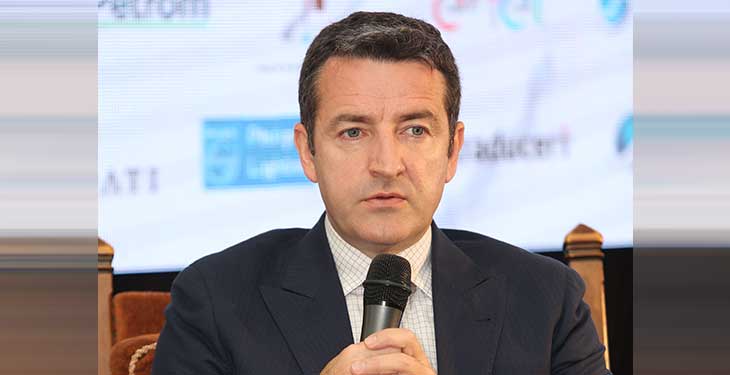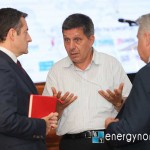This is the transcript of the message delivered by Corneliu Bodea, president of the Romanian Energy Center and executive director of Adrem, during the 2016 Energy Strategy Summit, held on May 31 at Snagov Palace. For a sum-up of the main ideas, check our previous material: 27 essential ideas after Energy Strategy Summit 2016.
I had the privilege to organize, together with my colleagues, with the members of the Romanian Energy Center, with prestigious Romanian energy companies, the fifth event Romanian Energy Day in Brussels. I was very impressed by the quality of presence, I mean the speakers, the guests, the members. The conference was held under the patronage of the European Parliament, attended by European Commissioner for Energy, Mr. Miguel Arias Cañete, but we also had an extremely important support from the Romanian experts, the Romanian authorities: Mr. President [Niculae] Havrileț, Mr. Radu Dudău, the Secretary of State Mr. [Cristian] Buşu and others. I think it was an important occasion for the Romanian energy community to present its ideas, its fears and, why not, the main challenges ahead, the main initiatives of the European Union’s energy policy. And I would like to refer here only to the two of them that I consider very important in relation with the well-chosen theme of today’s conference.
I mean the Energy Union and New Market Design. I had, as I said, the opportunity to discuss the energy strategy after an extremely well prepared presentation by Radu Dudău, in the context of the Energy Union. I personally believe that the Energy Union has two main dimensions: one that is related to security, and the other that concerns the market. Therefore, one of the things that have been widely discussed and affirmed in Brussels, which I think it should be more seriously analyzed, is defining the place of Romania on the energy map of Europe as a provider of security in the area. There is much fuzz around the so-called “energy hub” and personally I I do not understand exactly what this energy hub means. I would rather say that we should focus more on dividing two broad categories, on labeling the countries part of this Energy Union as energy security recipients – and thank God there are many around us, many countries that need external energy security – and energy security suppliers. With an intelligent energy mix I think Romania should assert itself as a supplier of energy security and in this sense to negotiate a favorable position in the context of Energy Union. Firstly, when about financing – there was a discussion about financing the BRUA project. Congratulations to Transgaz, a member of the Romanian Energy Center, for receiving that funding!! But I think it’s much more then financing, there is much more money and there are many more initiatives to complete this objective of an energy security provider.
About the energy mix, I think this is the key behind this concept of energy security provider. An intelligent and diverse energy mix can sustain this position of Romania. Romania stands well from this point of view, because Romania as a country has achieved its objectives in terms of renewable energy. We had the opportunity to have among with us Mr. Claude Turmes, which is the European Parliament rapporteur upon Energy Efficiency and renewables. But also the topic that is so heavily debated in the recent days, related to coal – I believe that Romania should maintain a reasonable coal production, also in line with all the environmental standards. We also speak of reactors 3 and 4. Why not to increase the share of nuclear energy in the whole energy mix, since it increases the flexibility and the stability of the system. And, of course, hydropower and all other forms of energy.
I am going to take the liberty to end my intervention to make a few remarks on biomass because it was mentioned earlier. I must, however, mention that I make these observations as an investor, so in my capacity as executive director of the companies in Adrem group. We are investors in this field and I insist on this for making to be clear that we have a direct interest in this area.
The second dimension I mentioned is the market. And here is a very important thing: regardless of the macro security level energy that Romania can offer or trade at EU level, we have an internal market. And the vast majority of production in Romania is directed and will be directed in the future for this market. Romania has been and is very good at implementing all market mechanisms, but now the European Union is preparing to deliver a new model, the New Market Design, which comes with concepts that may seem revolutionary now. But when we think about the recovery period and the time needed to execute energy investments, the timeframe might no longer seem so long. I mentioned here Distributed Generation, and I personally believe that in the future an ever increased percentage of energy generation will be distributed, localized generation. We also talk about Demand Response – so the client. It has been also discussed earlier the client’s position in the Romania’s energy strategy and I absolutely agree that this element was for too long regarded as the last in terms of importance in the energy chain from the producer, the transporter and the distributer to the consumer. I think that now, and we already see it on the power supply market, the consumers are in the center of energy. Therefore, in order to align with the European rules, but also in order to become energy efficient, Romania must invest in what we call Smart Grids – because they are the answer for increasing the networks flexibility, for coping with an increasingly higher flexibility of production, on one hand, and with the ever increasingly requirements from the consumer.
The risks for Romania are that, an increased gas and electricity interconnection capacity and a stronger interconnection with strong markets, be it Central Europe or, why not, as the next step, the Western European markets, the risk is that cheap energy would leave Romania. Which is why we must be extremely careful with our grids and with the way we design the energy mix, with how we build Romania’s position in terms of energy. We have a not so good heritage of this perspective, because as everyone knows, in the early 1990s, Romania has divided its electricity generation based on the production technologies. Therefore competitiveness is pretty questionable when comparing the megawatt produced from coal, regardless how efficient the technology used, with the megawatt produced from hydroelectric. This is a handicap for Romania in this race and must find solutions in order to overcome this handicap. Therefore I think one of the best solutions for coping with all this is investing in smart grids.
We are entering into a period when these two major EU strategic policies, namely the Energy Union and the New Market Design, must be very carefully considered in Romania, by the market players. I think we should not expect anymore to be told what to do. I think it is the role of companies in the energy market – that’s the producers, distributors, suppliers and providers of energy services – to engage. Just as you have said earlier, we should avoid the situation when each player fights under its own flag and represents its interests alone.
That is why CRE, and other associations as well, are extremely interested in accepting new members for better representing their interests. Given that the impressive number of great value speakers today, I will not take much more of your time, and I would like to take a final positon, as promised, on the biomass. Biomass was mentioned at least four times today in relation with Romania’s strategy. Most discussions during lunch were related to “Well, everyone mentions strategy, but what about the tactics, the implementation of this strategy? What will we do after we have finished the strategy?” I think it’s a very good question. And we had today a strategic statement on the importance of biomass in the Romanian energy mix and on the high potential Romania has in this regard. Still, at the same time, the Ministry of Environment excludes a substantial quantity of biomass from receiving green certificates. We are in Romania, and there is the ministry of Energy, and there is the ministry of Environment, and we have a good strategy related to biomass. We should find ways to adjust all these initiatives to the tactical level so that to avoid being criticized for, when the strategy will have been be completed, that we have plenty of strategies, but we still do poorly in implementing them.
Thank you.


